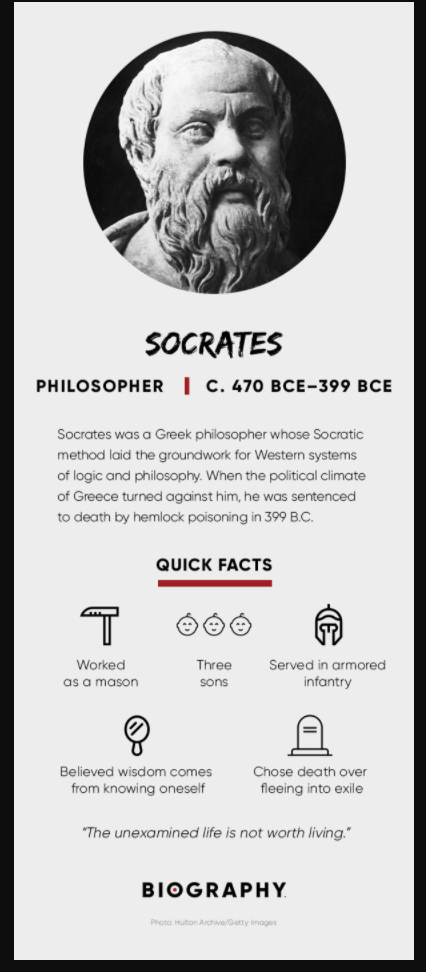What is a Socratic Seminar?
|
In our ELA 8 class, Socratic seminar, named after the Greek philosopher Socrates, is a student-facilitated discussion that helps students listen to and learn from each other. The goal of Socratic seminar is to help students develop a better understanding of the ideas, issues, and values expressed in a particular text. Because meaning is developed and deepened through focused discussion, Socratic seminar is not a place to debate, argue, or express personal opinions. Rather, students interact to draw out their own ideas and the ideas of their discussion mates in order to develop a shared and more complete understanding of the given text. We will use Socratic seminar throughout the school year with a variety of texts. Below you will find the tools we will use as we prepare for and improve our engagement in these worthwhile discussions. First in the documents below is the guide for developing OPENING, GUIDING, and CLOSING QUESTION as well as the template, which you will receive through Google Classroom.. What is the difference among these? => OPENING QUESTIONS
=> DEVELOPING QUESTIONS
=> CLOSING QUESTIONS
|
Writing Opening, Guiding and Closing Questions - Documents 1 & 2
Evaluating and Reflecting on the Socratic Seminar - Documents 3 - 6
Below is a set of 4 documents we will use in our Socratic Seminars. The first and second in this set we will use later in the school year, while the third in this set we will use throughout the school year as it is our scoring rubric for this work. The final document we will use only at the beginning of our Socratic Seminar learning experience.
Document 3 - Protocol with Focus on SEL Competencies
Socratic Seminar Protocol - Explanation by Claudia Bestor on Scribd
Document 4 - SEL Competencies Self-Assessment |
SEL Core Competencies Self-Assessment by Claudia Bestor on Scribd
Document 5 - Participation RUBRIC (WE WILL USE THIS ALL OF THE TIME!)
Document 6 - Learning What to Expect in the Norms of Socratic Seminar
Weekly Vocabulary Doc (We may not always use this.)
Each week you may be asked complete a multi-word set of vocabulary, the words being provided for you by your weekly Socratic Seminar leader. Leaders will find the words, record the page number and type out the sentence in which the word was found. Everyone in the Socratic Seminar (leader included) will then define each word, identify its part of speech (POS), determine synonyms and antonyms when applicable, and determine connotation (+, -, N).
Click on the link below to access your weekly vocabulary chart. Leaders, fill in the chart for the week and share it with your Seminar mates each Monday. Seminar members, your completed chart is due the Friday after you receive it from your leader.
LINK: docs.google.com/document/d/1CAMvF-RDitqFVnhO8RJWCwWuJTX9Yca4-8AJyKXL_mE/edit?usp=sharing
Click on the link below to access your weekly vocabulary chart. Leaders, fill in the chart for the week and share it with your Seminar mates each Monday. Seminar members, your completed chart is due the Friday after you receive it from your leader.
LINK: docs.google.com/document/d/1CAMvF-RDitqFVnhO8RJWCwWuJTX9Yca4-8AJyKXL_mE/edit?usp=sharing
"The important thing is not to stop questioning. Curiosity has its own reason for existing. One cannot help but be in awe when he contemplates the mysteries of eternity, of life, of the marvelous structure of reality. It is enough if one tries merely to comprehend a little of this mystery every day."
-Albert Einstein
